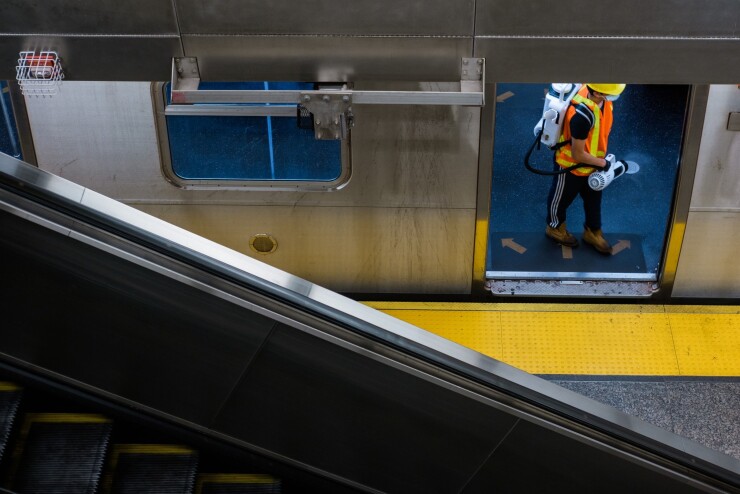The newest Wall Street hit to New York’s Metropolitan Transportation Authority came Monday when Kroll Bond Rating Agency downgraded its primary transportation revenue bond credit to AA from AA-plus.
Kroll assigns a negative outlook.
“The downgrade reflects the expectation that the sharp decline in ridership due to COVID-19 will continue well into 2021,” Kroll said in a statement. The decline in ridership has caused gross debt service coverage for 2020 to drop to 4.8 times from 8 and 9.1 times in the previous two years, Kroll said, citing the MTA’s midyear forecast.
“The negative outlook reflects KBRA’s expectation of a prolonged reduction and slow recovery in ridership to pre-pandemic levels, as well as the uncertain timing and amount of federal and state support to address the worsening operating gap,” Kroll added.
Kroll placed the MTA on watch downgrade on March 24.

The state-run MTA, which operates New York City’s subways and buses, two commuter rail lines and several interborough bridges and tunnels, is one of the largest municipal issuers with roughly $46 billion in debt, including special credits.
The authority is bleeding money from the effects of the coronavirus. Shutdowns and stay-at-home measures to counter the pandemics have pummeled its revenue sources while costs have spiked because of the required deep cleaning to maintain the system.
Congress is gridlocked over the latest coronavirus rescue package.
“Kroll’s action reflects the financially stressed conditions under which the MTA finds itself," MTA spokesman Aaron Donovan said. "We are thereby urgently calling on Congress to provide $12 billion in emergency aid, and are heartened by the inclusion of robust emergency assistance in the House’s COVID relief bill, HEROES 2.0.”
Moody’s Investors Service last month downgraded the MTA to A3 from A2 in the first hit to the authority from Wall Street since March. The MTA has received several other warnings from rating agencies.
Based on the MTA’s latest daily data, average ridership in September dropped by 69% for subways, 50% for buses, 70% for the Long Island Rail Road and 73% for Metro-North year-over-year.
“While subway ridership continues to trend favorably as New York City progresses through various phases of reopening, the increases in ridership appear to have plateaued in recent weeks,” Kroll said.
Ominous warnings have come from Mayor Bill de Blasio this past week about a pullback in the reopening process. De Blasio cited rising coronavirus cases including nine red-flag neighborhoods in Brooklyn and Queens.
According to data on the Municipal Securities Rulemaking Board's EMMA website, a block of Series 2012F transportation revenue bonds maturing in 2025 that originally priced at 117.643 cents on that dollar with a 5% coupon, sold to a customer Monday at a price of 104.331 cents with a 4.136 yield.
The MTA has $2.15 billion of bank lines of credit expiring in 2022, according to Kroll, with $1.67 billion undrawn as of Sept.15. It has exhausted the $3.9 billion in federal CARES Act funding it received in March for operating purposes.
“Even if additional funding materializes, it is unlikely to be enough to address the MTA’s structural imbalance, which pre-dates recent events,” Kroll said.
The authority may also apply to use its remaining $2.9 billion available under the MLF program. In August it sold $450 million of transportation revenue bond anticipation notes to the Fed at 1.93%, after rejecting bids from banks in the open market. MTA officials said the move saved the authority $12 million.
Mass transit systems nationwide are under siege, according to municipal bond analyst Joseph Krist.
“The problems of New York's MTA are well documented but it's not the only MTA facing revenue reductions,” he said, citing the Los Angeles Metropolitan Transportation Authority.
There, the authority’s directors voted to approve a $6 billion budget for the 2021 fiscal year, down $1.2 billion from the previous year. The move would extend current temporary reductions in service through the end of the fiscal year. It comes as the Los Angeles authority estimates a sales-tax revenue shortfall of roughly $100 million per month.
Kroll cited three pillars that continue to support its rating of New York MTA’s transportation revenue bonds and bond anticipation notes: pledged revenues used to meet pro rata monthly debt service requirements; a strong management team; and the essential nature of the system to the regional economy.
Kroll also cited the delay in dedicated payments from the state under the Metropolitan Mass Transportation Operating Assistance program, which the MTA acknowledged in September. Additionally, the MTA is now estimating a reduction in these payments for 2020-2023.
“The delay of funds is inconsistent with KBRA’s expectation of uninterrupted state support of MTA operations and if sustained may lead us to re-examine this view,” Kroll said. “Furthermore, other state and local subsidies, some of which are reliant on economically sensitive taxes, are reduced due to an unprecedented pandemic. As such, the timely release of state-appropriated funds is critically important.”
State and MTA budget documents assume a $600 million raid on MTA funds, according to the good-government group Reinvent Albany.
“Two wrongs will not make a right, and this planned raid makes a mockery of the whole idea of ‘dedicated’ funds,” said senior research analyst Rachel Fauss.





